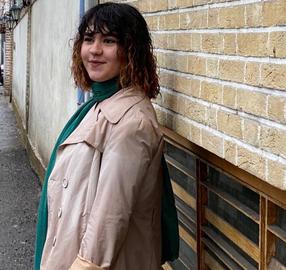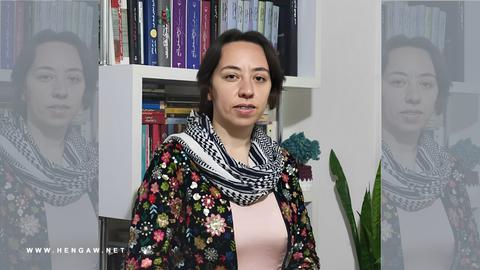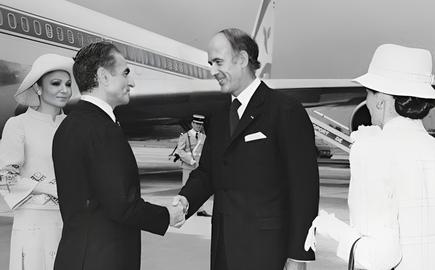Saghi Ghahraman is a well-known name in the Iranian LGBTQ community. The queer activist lives in Canada. She is a co-founder of the Iranian Queer Organization (IRQO), an advocacy group for LGBTQ rights in Iran that was based in Toronto since 2007. It was active until 2019 when she voluntarily dissolved it to comply with Canada’s NGO laws. In those years, she helped over 1,000 Iranian LGBTQ refugees resettle in a safe country.
Before anything else, Ghahraman believes that she is a poet, or rather a queer poet. “I consider poetry part of my identity,” she says. “I started very early to express myself through writing poetry. Poetry was also a big part of my upbringing, like politics. If I lived in a different time and place, I might have dedicated my life, the old-fashioned way, to activism. But I would be a poet, regardless. I see the world through writing poetry. When I read my own poetry, I am reading it for the first time, and I explore the world of the poem. I am both the writer and the audience. It’s my connection to the outside world.
“My poetry allows aspects of my political life to take space within my writing. Professional and political are both secondary to poetry.”
Ghahraman was born in 1957 in the northeastern Iranian city of Mashhad: “I was born and raised in a clan descended from the Qajar dynasty, concerned with politics and political dilemmas, deeply familiar and exposed to corruption, oppression and abuse of power. Growing up, I was well-educated in classic and modern literature that addressed the politics of their respective periods. A few of my extended family members were either imprisoned or exiled for opposing the Pahlavi regime.
“As a teenager, I was aware but not actively involved. On top of it all, my uncle was employed in Savak (Shah’s secret police), exposing us to insider tales of interrogations, tortures, and such. My father, a high-rank officer in the army, opposed the Shah’s regime and widespread abuse of power. In high school, I composed essays and fiction, and stealthily wrote slogans of protest on blackboards! The fear of the Shah’s agents was overwhelming in high school but during this time my focus was on writing essays, poetry, and fiction. It was in university and after the revolution when I joined a political party and started working steadily towards the cause. I worked with the [Communist] Tudeh Party of Iran, and its Women’s Organization until I fled Iran [in 1984].
“I joined the Tudeh Party of Iran during the [Islamic Republic’s] Cultural Revolution in universities when all the students and educators were sent home for over two years [between 1980–1983] . By then I was convinced that the revolution itself was the next problem one must fight with. But the power imbalance between horrified masses and the leading group that had assumed power was shocking.”
When the Islamic Republic officially outlawed the Tudeh Party, Saghi and her family escaped to Turkey and, in 1987, she immigrated to Canada after she was granted asylum: “When I arrived in Canada in December of 1987, I immediately started working with a branch of the Tudeh Party in exile, reading material in English, writing about my own vague understanding of my gender identity and sexual orientation, exploring life, mothering my kids, and investigating how to safely get a divorce.
“I was still carrying the fears that my husband had instilled in me around divorce. I am extremely grateful for my gender identity during those early years I came to Canada. It was my guiding light. It was my own private mentor. It was because of my gender identity that I could see things, wrong and right, that others in the community saw only two decades later. In the beginning, in Canada, the Iranian community and locals thought of me as an extremely modern woman. Though as it turned out, a few years later, I was not modern. I was Queer. My interpretation of things was different.”
A year after arriving in Canada, Ghahraman left the Tudeh Party and started publishing her works in Persian-language journals published by expatriates. As of now, she has published three poetry books — “Of Lies”, “The Whore is the Savior” and “Saghi Ghahraman, That’s All” — and one collection of short stories, When “You Are Lonely, It Is Painful to Be a Cow.” Her English works have appeared in Amnesty International’s 2000 Collection of Poetry, Diaspora Dialogue’s TOK, and the Calgary-based quarterly The Filling Station.
Through the PEN Writers in Exile program, Ghahraman was a visiting editor at Descant, a quarterly literary magazine that published new and established contemporary writers and visual artists from Canada and around the world, and a writer-in-residence at the Owen Sound Public Library in Ontario. She showed her Collection of Photos in 401 Gallery, Richmond Toronto, and Last Studio Chicago.
About IRQO which she founded, Ghahraman says: “In 2008 when I registered IRQO as an NGO with two silent partners, securing a reliable connection with rights organizations was my priority. But there was another reason for a strong and outspoken IRQO, and that was to bar Western media, tabloids, Gay exclusive media, and loud gay activists such as the late Doug Ireland and Peter Tatchle from grabbing at any news about the gay Middle East to create commotion and bring more harm on the community. Also, the US government used the Iranian LGBT cause as a weapon against Iran’s regime which again brought more harm than protection.
“Another pressing problem was the wave of gay men and Trans Women who fled to Turkey to claim refugee status. The UNHCR wasn’t very familiar with sexual orientation, gender identity, and local cultures. Police were brutal when dealing with LGBT asylum seekers. Town folks were hostile. Rape and murder happened on numerous occasions. An organization to serve as a bridge and representative was extremely needed.
“These were the main concerns for me, personally, and why I committed myself to IRQO from 2007 until 2019. During this period, we did a lot more than we had planned. Our achievements were huge. IRQO and I were trusted by the UNHCR, Amnesty, Human Rights Watch, and gay rights organizations, which helped the work we were doing. During this time, IRQO prepared several Universal Periodic Reviews to address human rights violations.
“During the 15 years IRQO was active, less than a few LGBT activists in Diaspora were willing to come out and work in person. As an organization, we were constantly juggling between having both a public and underground presence. Another common obstacle we faced was that almost all members of the Iranian LGBTIAQ suffered from PTSD, prescribed drug dependency, suicidal tendencies, plus physical injuries caused by sex-adjustment surgeries. That meant colleagues and team members disappeared with symptoms for unknown periods.
“It all changed in recent years and now there [are] many queer activists inside Iran and in Diaspora. The younger generation of queer activists are filling the gap, be it in art and literature, journalism and media, politics, and activism, and constantly raising awareness.”
However, Ghahraman warns: “In recent years, LGBT activity became riskier in Iran, more alienated from the mainstream and its institutions. Isolated attempts to paint the walls and bridges with the LGBTIAQ motto was linked to Israel and US, rather than the genuine bravery of isolated LGBTIAQ activist. If we talk about a more current ‘current’, there is going to be added hostility against the LGBTIAQ and their involvement or assumed involvement in this recent uprising for the murder of Mahsa Amini in the hands of Iranian morality police. Islamists who assumed power in 1979, took their first steps against civil society by stripping women of civil rights and the LGBT of their human rights. Their hostile approach was not an ideologic approach, but a tool, a weapon. They’ll need this weapon now more than ever.”
Co-founding the Gilgamishan publishing house was another contribution of Ghahraman in giving voice to the Iranian LGBT community: “A couple of months before Tehran’s International Book Festival in 2009, when writers in Iran complained about censorship and books banned by the Ministry of Culture and Islamic Guidance, Mehdi Hamzad, one of the leading voices [among Persian-language bloggers] wrote: ‘As gay writers, we don’t even exist, and can’t even have the privilege to whine over censorship.’ That was the spark. So other leading bloggers in Iran and I discussed it and decided to prepare manuscripts of poetry and fiction by bloggers, and submit them for publication to Afra, one of the pioneers of Iranian publications in exile in Canada.
“We created the blog Iranian LGBT Book Festival on the same day of the Tehran International Book Festival with around 25 titles. A year later, we decided to register a publication exclusively for the work of the LGBT. Hamseresht, the strongest voice of the time among Iranian LGBT bloggers, who came up with the idea of a digital publishing house of our own, suggested Gilgamishan for its name, referring to the first mythical gay figure, most famous among the gay community for his same-sex love affair.
“Gilgamishan is run and moderated by volunteers who edit, do layouts, and design covers. All works are digital and submitted to Library and Archives Canada. This, and the permanent column we published on Radio Zamaneh, a popular and well-known Farsi-language media based in the Netherlands, were big steps, especially because it was through these publications that we were able to transform the face of Iranian LGBT in the eye of the mainstream. Students’ Park which is a very large park in the center of Tehran, has been known as the gathering and socializing center of Iranian LGBTs for many decades, is no longer the only point of reference. Even with their pseudonyms and obscure whereabouts, these writers added to the picture of the gay, lesbian, and trans women and men in mainstream media and within families.”
visit the accountability section
In this section of Iran Wire, you can contact the officials and launch your campaign for various problems


























comments